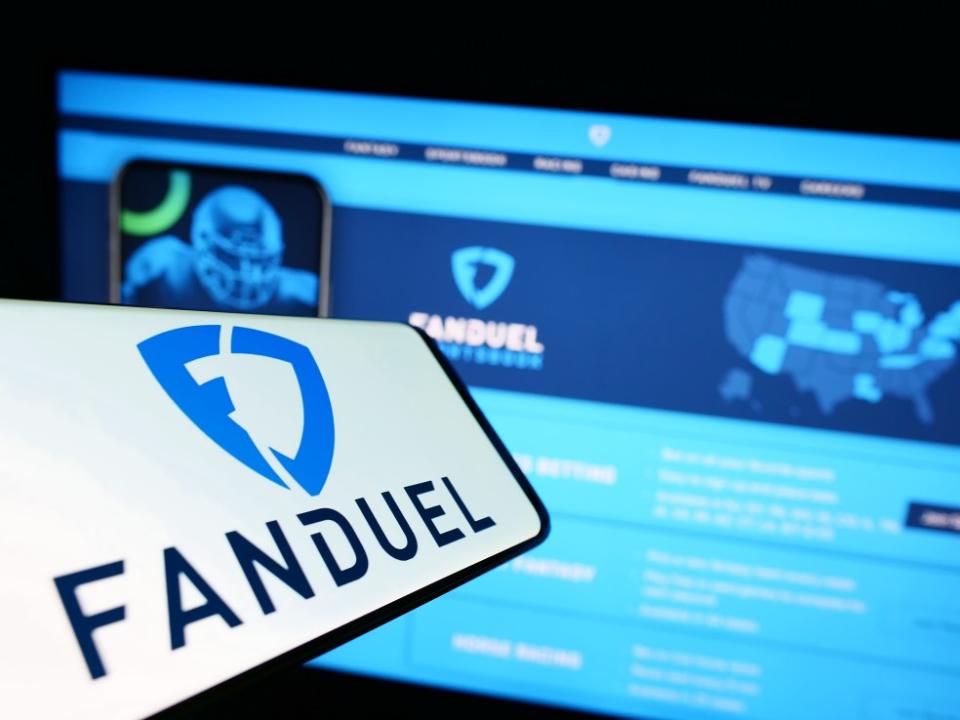Flutter: The house always wins but can Fanduel’s gold rush last?

The US is looking like El Dorado for betting companies right now.
Gambling giant Flutter’s secondary listing on the New York Stock Exchange (NYSE) today has gone down well with investors but the company will need to fight for its future amid a fiercely competitive US market.
The NYSE’s new stock rose two per cent on Monday but in London, where Flutter’s primary listing still resides, they went the opposite way, down as much as two per cent.
Flutter boss, Peter Jackson, suggested that London may not always be the main home for the company.
He said: “We believe a US primary listing is the natural home for Flutter given Fanduel’s number 1 position in the US, a market which we expect to contribute the largest proportion of profits in the near future.”
Sports betting is now legal in nearly 40 US states, although not all of them allow it on mobile devices. Despite a highly unlikely expansion to all 50 states, the US market presents significant growth potential for betting services firms and investors.
While controls are tightening in more established markets like the UK and Europe, regulations in the States have eased since the repeal of the Professional and Amateur Sports Protection Act in 2018.
Betting companies have wasted little time taking advantage of this, including Flutter, which took a timely punt on US online sports-based fantasy games business Fanduel in 2018.
This has played out well for the company, which also owns Paddy Power and Betfair. Fanduel now has an “excellent position” in the US, with Flutter well placed to ride on this momentum, according to AJ Bell investment director, Russ Mould.
But he warned that “competition will be fierce and betting services providers will have to innovate, market hard and offer punters value to attract their custom, even in a growing market.
“Flutter’s share price slide of the past year suggests it will not be a case of easy money, even if the house always wins in the end,” Mould added.
From a peak of 16.7 pence per share in May, Flutter’s stock dropped to lows of 12.2 pence per share in November as it grappled with a downturn in its Australian business.
In its latest trading update, the company’s revenue was damaged by customer-friendly sports results, with one NFL game costing the bookie $80m (£63m) alone.
And Flutter needs to be wary of low-loyalty rates in the US, said the chief executive of consulting firm GWS Magnify, Dr Paul Carter.
Nearly half of sports book betters use more than one app on their phones to browse bets and scour out the best odds, according to GWS.
Carter said all the major companies are “trying lots of different ways to get people to stay on their apps; to get them on their app in the first place from boosts and promotions and then to stay on the app for as long as they can through streaming or some other area.”
As of October 2023, Fanduel and Draftkings held roughly two-thirds of US market share, with BetMGM trailing at 17 per cent.
But Draftkings surpassed Fanduel in app usage time in July, increasing its lead by almost 50 per cent. In October, Americans spent around 30m minutes on DraftKings compared to about 20m on Fanduel.
In a bid to stay ahead of the competition, gambling companies are turning to discounts and promos.
“I think promotions and boosts are the number one reason why people jump backwards and forwards,” said Carter.
“And these guys, the sports betting companies, have spent a lot of money trying to attract betters and I think that’s why most of them are not making profit,” he explained.
In another survey, GWS revealed that 70 per cent of Americans using multiple sports betting apps decided where to place their wagers based on the current promotions and boosts available.
In Maryland alone, Fanduel spent $5.5m on discounts and promotions in its most recent quarter, as per a Jefferies note. Not all US states report on promotions.
Can the US market growth last? “Well, the short answer is, yes, I think it definitely will last. The genie is out of the bottle as it were, with sports betting in the US,” said Carter.
One in three Americans plan to place a bet using a sportsbook mobile app in 2024, GWS have said.
The rapid growth has prompted concerns over a potential wave of suicides and mental health problems on the horizon.
America’s lawmakers are concerned. One congresswoman told the Guardian this week that sports betting is “proliferating like never before”, urging the US to do more research and develop treatment before it gets “out of control” and worsens a nationwide mental health crisis.
Carter reckons the US could put similar measures in place to the UK, such as app reminders to take a break and gamble responsibly.
Renewed scrutiny from politicians and regulators could also come from any whiff of corruption, akin to the 1919 Black Sox scandal. Even if it was just a matter of points shaving, Mould said this could pose “the biggest danger to the US growth story”.
“Any such occurrence – with hard proof of it – would prompt fresh scrutiny of sports betting in the US, from politicians and regulators alike, and potentially lead to restrictions on betting activity, either on a state-by-state or federal level,” he said.
The ultimate winner of the US betting gold rush has not emerged yet but a big test will be the Super Bowl, one of the biggest peaks for betting companies, which takes place in just under two weeks.

 Yahoo Finance
Yahoo Finance 